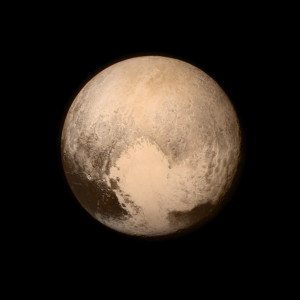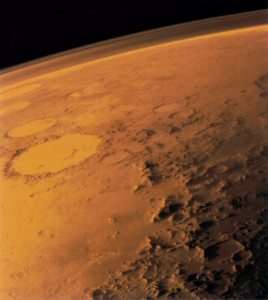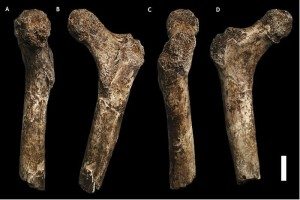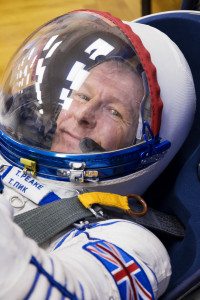2015 in Science: Pluto, Bacon and the Law of Urination
2015 has been a pretty monumental year in science and technology, with several important achievements being made both here on Earth and in the uncharted territories of space. Several historic discoveries were also made: exciting new exoplanets; ancient human species and perhaps most importantly, the “universal law of urination” (more on that later).
The most memorable news of 2015 was the first close-up imaging of dwarf planet Pluto. During July, NASA’s New Horizons spacecraft captured several breath-taking shots of the dwarf planet’s sweeping ice plains and rugged mountain ranges. The data from New Horizons revealed a lot of new information about Pluto and proved that our solar system’s often forgotten world has a lot of character. As one scientist on the New Horizons project commented: “I think the solar system saved the best for last”.
We’ve also been making some significant discoveries outside our solar system. In July, NASA publicly announced the discovery of exoplanet Kepler-542b, a rocky Earth-like world 1,400 light years away that was soon dubbed ‘Earth’s twin’ by the media. Our ongoing mission to find a possibly new home for humanity have often faced obstacles however. Researchers at Warwick University found that the atmosphere of another Earth-like planet (Kepler-438b) has most likely been stripped away by a superflaring Red Dwarf star. Our search for a potential new home, then, will continue in 2016 and beyond.
There’s also been a renewed interest in our neighbour Mars this year- partly due to Matt Damon but also due to NASA’s announcement that they have found evidence that liquid water currently flows on Mars. Planned missions to Mars have also picked up a lot of attention. The controversial Mars One space mission (or extravagant scam, depending on your point of view) shortlisted 100 candidates for its one-way journey to Mars, whilst NASA revealed its own plans to get humans living on Mars within the next few decades.
Back here on Earth, a crucial event in our struggle against climate change happened in this year’s climate change conference in Paris this month. The deal that was eventually agreed upon unites all of the world’s nations in a single agreement to tackle climate change for the first time in history. The agreement includes long-term plans to keep global temperatures well below 2.0⁰C above pre-industrial times. This partly legally binding, partly voluntary deal was not completely perfect but it remains a significant step in our efforts to combat climate change.
This global event followed a noteworthy story here on campus. In November, it was reported by the Boar that Warwick University is currently failing to meet its ambitious carbon emissions reduction target of 60% by 2020. Warwick were not the only university guilty of this however- in fact, a rather depressing 76% of British universities are set to miss their 2020 emissions targets. Despite the pivotal deal struck in Paris then, this story closer to home serves as a reminder that climate change will continue to be a pressing issue for years to come.
In September 2015, we also welcomed a new addition to the human race’s complex family tree. A new species of ancient humans- called Homo naledi- were discovered in a South African cave that can only be described as a claustrophobic’s worst nightmare. Our distant cousins were described as “long-legged”, “pinheaded” and “gangly”, and it was claimed that the skeletons’ location in a cave proved Homo naledi deliberately disposed of its dead in a ritualised fashion- a pretty significant finding for anthropologists if true.
In the midst of all these historical discoveries, it’s easy to forget the scientists that spend their time studying bizarre things that no one else can be bothered with. These pioneers of the inane and ridiculous were celebrated in the annual Ig Nobel award ceremonies, which recognises the weirdest achievements in scientific research. Winners this year included a group of physicists who found a universal “law of urination” for all mammals and Michael Smith, who spent 38 days being stung by bees across his body to determine where stings hurt the most. Turns out it’s the nostril, the upper lip and the shaft of the penis- a conclusion which underlines, more than anything, the sacrifices scientists often go through for their work.
Unfortunately, 2015 was also a year that reminded us all that the human race could soon be doomed. Stephen Hawking continues to warn the public about the threat of artificial intelligence; most of us are happy pretending that antibiotic resistance isn’t happening and in June, a study confirmed that Earth is witnessing the start of a mass extinction event caused by human activity. Although, none of these worrying stories compared to the furore caused when it was revealed that bacon now ranks alongside cigarettes as a major cause of cancer. Dark times indeed.
If we are truly doomed as a species, then at least we got treated to a few cosmic spectacles this year. In March, a total solar eclipse was visible throughout much of Europe. Later on in the year, we were wowed by a total lunar eclipse which turned the moon a dark red-brown colour. The event was made even more impressive by fact that the moon was a ‘supermoon’ during the eclipse, which is when the moon makes it closest approach to Earth during its orbit. If you missed this particular lunar eclipse, then I’m afraid that a similar one won’t be happening again until 2033.
If you’ve been staring into the night sky a lot this year then, you might have caught a glimpse of the International Space Station flying overhead, which is currently the home of first official British astronaut Tim Peake. 2015 thankfully ended on a positive note, with the British public celebrating as Peake launched into space for a six-month stay on board the International Space Station. This led to a particularly memorable Christmas for one woman, who received a call from Peake asking “Hello, is this planet Earth?” after he rang the wrong number. Peake’s astronaut adventures remind us of the great achievements made in science and technology this year and will no doubt inspire countless budding scientists and astronauts to follow in his footsteps.
2015 was a year of triumphs in the world of science and technology. Alongside the historic discoveries being made, several events continued to build upon the public’s fascination with space exploration. Going into 2016, one can only wonder what momentous achievements and discoveries will be made by scientists across the world and beyond.






Comments